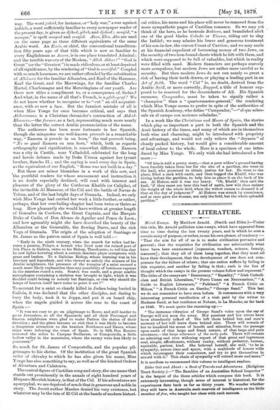CURRENT LITERATURE.
Mixed Essays. By Matthew Arnold. (Smith and Elder.)—Under this title, Mr. Arnold publishes nine essays, which have appeared from time to time during the last twenty years, and in which he sees a certain unity of purpose, or rather, touse his own phrase, of tendency :— " That the aim for all of us is to make civilisation pervasive and general ; that the requisites for civilisation are substantially what have been here enumerated [expansion, conduct, science, beauty,. manners] ; that they all of them hang together, that they must all have their development, that the development of one does not com- pensate for the failure of others ; that one nation suffers by failing in this requisite, and another by failing in that ; such is the line of thought which the essays in the present volume follow and represent." The titles of the essays are " Democracy," "Equality," "Irish Catholi- cism and British Liberalism," " Pomo Unnm est Necessarium," "A Guide to English Literature," "Falkland," "A French Critic on Milton," "A French Critic on Goethe," "George Sand." This last we do not remember to have seen before, It commences with a very interesting personal recollection of a visit paid by the writer to Madame Sand, at her residence at Nohant, in La Manche, as far bask- as 1846. We must quote the summing-up :—
" The immense vibration of George Sand's voice upon the ear of Europe will not soon die away. Her passions and her errors have been abundantly talked of. She left them behind her, and men's memory of her will leave them behind also. There will remain of her to mankind the sense of benefit and stimulus, from the passage upon earth of that large and frank nature, of that large and pure utterance,—the large utterance of the early gods. There will remain an admiring and ever widening report of that great and ingenuous soul, simple, affectionate, without vanity, without pedantry, human, equitable, patient, kind. She believed herself, she said, ' to be in sympathy, across time and space, with a multitude of honest wills which interrogate their conscience, and try to put themselves in accord with it.' This chain of sympathy will extend more and more." It is needless to recommend this volume to intelligent readers.


































 Previous page
Previous page